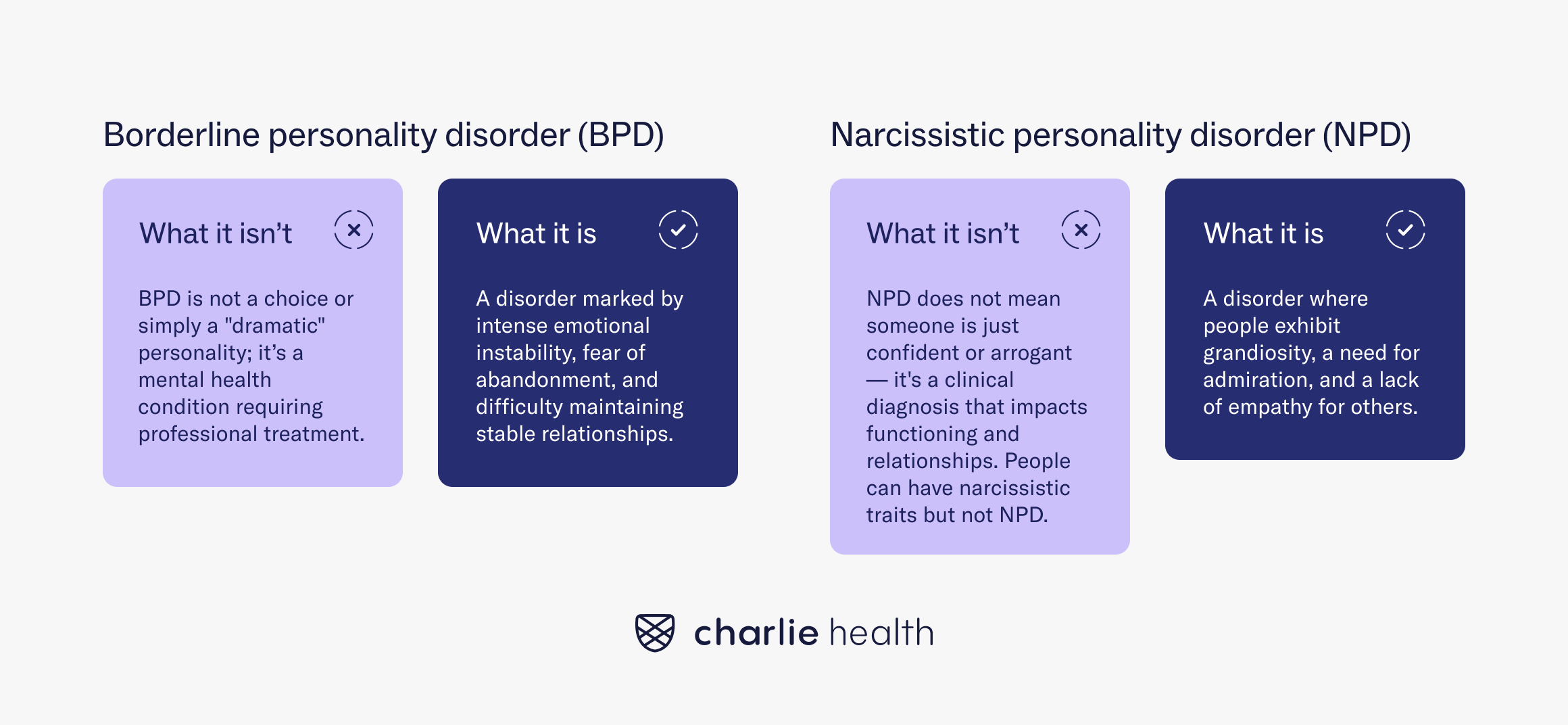
Table of Contents
Borderline Personality Disorder vs. Narcissistic Personality Disorder: More Similar Than You Think

Written By: Dr. Rasna Kaur Neelam

Clinically Reviewed By: Dr. Don Gasparini
Updated: June 12, 2025
8 min.
Borderline personality disorder and narcissistic personality disorder may have more in common than you think. Read this article to learn more about the similarities and differences.
Learn more about our Clinical Review Process
Table of Contents

A personality disorder is a mental health condition in which someone’s personality—their beliefs about themselves and actions toward others—interfere with interpersonal relationships and everyday life.
Like many mental health conditions, there are a range of personality disorders, which are organized into three groups—known as clusters A, B, and C—based on shared symptoms.
Borderline personality disorder, narcissistic personality disorder, histrionic personality disorder, and antisocial personality disorder comprise the four cluster B personality disorders, which are usually marked by emotional, dramatic, and unpredictable behaviors.
In this article, we will compare and contrast two cluster B personality disorders: borderline personality disorder (BPD) and narcissistic personality disorder (NPD).
Keep reading to learn about the similarities and differences between the disorders, as well as treatment options for both.
Borderline personality disorder and narcissistic personality disorder: What are the similarities?
On the surface, BPD and NPD appear to be quite different. People with BPD usually fear abandonment and struggle with unstable relationships, mood disorder symptoms, low self-confidence, and risky behaviors, including self-harm.
On the other hand, NPD is defined by narcissistic traits like low empathy toward others and feelings of self-importance, superiority, and grandiosity. However, these personality disorders actually share many characteristics in common, as reviewed below.
Emotional dysregulation
Emotional dysregulation is both a personality trait and a symptom of mental illness. When people have emotional dysregulation, they are unable to control their emotions. Instead, it often feels like their emotions control them.
Emotional dysregulation is one of the key features seen in people with BPD. These individuals may experience rapid and intense changes in their moods.
One minute, they may feel happy and elated; the next, they may be anxious and crying. For those with BPD, these strong emotions come from a fear of abandonment.
People with NPD may also have emotional dysregulation, but it may not be as noticeable. Those with NPD may quickly become angry, anxious, or impulsive.
These strong emotions are usually triggered by threats to their self-esteem rather than a fear of abandonment, as seen in those with BPD. Although the triggers for the emotions may differ, people with NPD and BPD may both allow their emotions to control them and their actions.

Difficulty with relationships
Personality disorders impact the way people see themselves and see others. Acting on these distorted beliefs almost always leads to difficulty forming and maintaining relationships with family members, friends, romantic partners, children, and more. This is certainly the case with BPD and NPD.
People with BPD have difficulty maintaining stable, healthy relationships. For this reason, they may have multiple romantic partners in quick succession or have new groups of friends every few months.
This happens for several reasons. First, people with BPD fear abandonment and for this reason, may hold onto relationships too tightly. Also, those with BPD may take any slight criticism as an attack on their self-worth.
These individuals are usually more sensitive and may be described as having “thinner skin.” Finally, people with BPD often oscillate between idolizing or devaluing others without understandable logic or reasoning. This can make it hard for others to feel close to, trust, or understand someone with BPD.
People with NPD also struggle with relationships but for a different reason. Those with NPD are often self-centered and struggle to empathize with others.
As you can imagine, forming a deep, long-lasting relationship or friendship is difficult if one person believes they are better than the other.
When people with NPD do form relationships, it is often to exploit the other individual for personal gain, and it can even lead to emotional abuse, known as narcissistic abuse.
Desire for approval
It’s normal and healthy to want to fit in, maintain relationships with family and friends, and be desirable and attractive to a partner.
However, when someone has a personality disorder, their desire for approval can manifest in an unhealthy way. People with both BPD and NPD crave and need the approval and attention of others.
In BPD, this desire for attention and love fills a void of loneliness and a fear of abandonment and rejection. People with BPD often act out or cling to toxic relationships when they feel this void has not been filled.
Although those with NPD already have a high sense of self-esteem, they, too, continue to desire and need approval, admiration, and praise from others.
Sometimes, this is meant to feed their already-inflated ego and sense of self-worth. In other forms of narcissism, such as covert narcissism, people with NPD may secretly have a low sense of self-worth and may rely on praise from others to feel better about themselves.
Impulsivity
Impulsivity is the tendency to do or say something without thinking it all the way through. Sometimes, impulsivity can be harmless.
But other times, ignoring the potential consequences of our actions can result in dangerous or unhealthy behavior; this is the kind of impulsivity displayed by people with BPD and NPD.
Due to emotional dysregulation and a desire for immediate gratification, people with BPD can display impulsivity in a number of ways. Examples include self-harm, such as cutting, sexual promiscuity, use of alcohol or drugs to medicate emotions, and more.
People with NPD may also display impulsive behavior, but their motivation is usually different. Due to feelings of grandiosity and an inflated sense of self-worth, narcissists may feel they will succeed with risky behavior and face no consequences.
For this reason, people with NPD may participate freely in risky behavior such as gambling, unprotected sex, reckless driving, and making large or risky investments.
Comorbidities
Personality disorders frequently coexist with other mental health conditions. When a person has more than one mental health condition at a time, known as a comorbidity, they usually have greater functional impairment in their everyday life.
Studies demonstrate that BPD patients are more likely to have psychiatric comorbidities such as depressive disorder, bipolar disorder, anxiety disorder, sleep disorder, and substance abuse disorder like alcohol abuse than those without BPD.
Similarly, studies demonstrate that NPD is also associated with psychiatric comorbidities. These include high co-occurrence rates of substance abuse, mood disorders, anxiety disorders, and other personality disorders.
Interestingly, BPD and NPD can also be comorbidities: “borderline narcissist” refers to a person with both NPD and BPD.
Borderline personality disorder and narcissistic personality disorder: What are the differences?
Although BPD and NPD have many similarities, two key differences exist. Specifically, people with BPD and NPD see themselves differently and have different behavioral motivations. Keep reading to understand these differences in depth.
Self-image
One of the major differences between BPD and NPD is related to self-image and identity. People with BPD tend to have an unstable and low self-image.
They are unsure of their identity and have difficulty confidently explaining it to others. Several factors can cause this, including past trauma or invalidation in early years.
On the other hand, people with NPD have an inflated sense of self-image, called grandiosity. This hallmark symptom of NPD describes when a person has an inflated and unrealistic view of how important they are, how good they are at things, how many achievements they have accomplished, and more.
Although people with NPD appear to have a stable sense of self, it is also fragile and requires constant validation or praise from others.
Behavioral motivations
Another major difference between these two personality disorders is the motivations people have for their behaviors.
As mentioned, one of the major motivations for people with BPD is a fear of abandonment and rejection. This fear, coupled with emotional instability, can lead to several of the behaviors commonly described above, such as impulsive, self-harming, and risky behavior as well as difficulty maintaining stable relationships.
People with NPD, on the other hand, are driven not by fear of abandonment but rather by an inflated sense of self. People with narcissistic behavior are motivated to do actions that represent their egotistical nature, will benefit them, or lead to praise.
As mentioned, this behavior may include reckless driving, gambling, taking on risky investments, entering into relationships solely for personal gain, or participating in altruistic endeavors solely for attention or compliments.

The Best Mental Health Skills Charlie Health Clients Learned During Treatment
Charlie Health Editorial Team
What treatment options exist for these two conditions?
Supporting loved ones with BPD or NPD can be challenging. NPD and BPD both present unique treatment challenges; treatment is often long-term or requires multiple modalities. Although treatment may be difficult, there are several ways to receive help.
The mainstay of treatment for both BPD and NPD is psychotherapy, also known as talk therapy. Working with a trained clinician who can understand and treat personality disorders and comorbid mental disorders will lead to the best chance of improved day-to-day living for people with BPD or NPD.
People with BPD are often referred to a mental health professional who specializes in a type of therapy called dialectical behavior therapy (DBT).
Through DBT, people gain skills like mindfulness, distress tolerance, interpersonal skills, emotional regulation, and more. DBT was created for people with BPD, but it has since been adapted to address various mental health conditions, including NPD.
For people with NPD, one of the hardest challenges is having the person believe they are struggling and may benefit from mental health treatment. Often, those with NPD do not believe they need help and are resistant to therapy.
If they are open, cognitive behavioral therapy (CBT), a common type of talk therapy that helps people understand how their thoughts, feelings, actions, and behaviors are connected, may be of benefit.
This type of therapy may be long-term for people with NPD since they often need time to reframe their previous ways of thinking.
Support for personality disorders at Charlie Health
If you or a loved one are struggling with a personality disorder, including borderline personality disorder or narcissistic personality disorder, Charlie Health is here to help.
Our virtual Intensive Outpatient Program (IOP) offers more than once-weekly support for people dealing with serious mental and behavioral health conditions (including personality disorders) and their families.
Charlie Health combines personalized therapy, supported groups, and family therapy to provide holistic, intensive care—support that may be particularly helpful for those with personality disorders.
At Charlie Health, our trained clinicians have experience working with people with BPD, NPD, and other personality disorders and include relevant therapies, like dialectical behavior therapy skills, into treatment.





